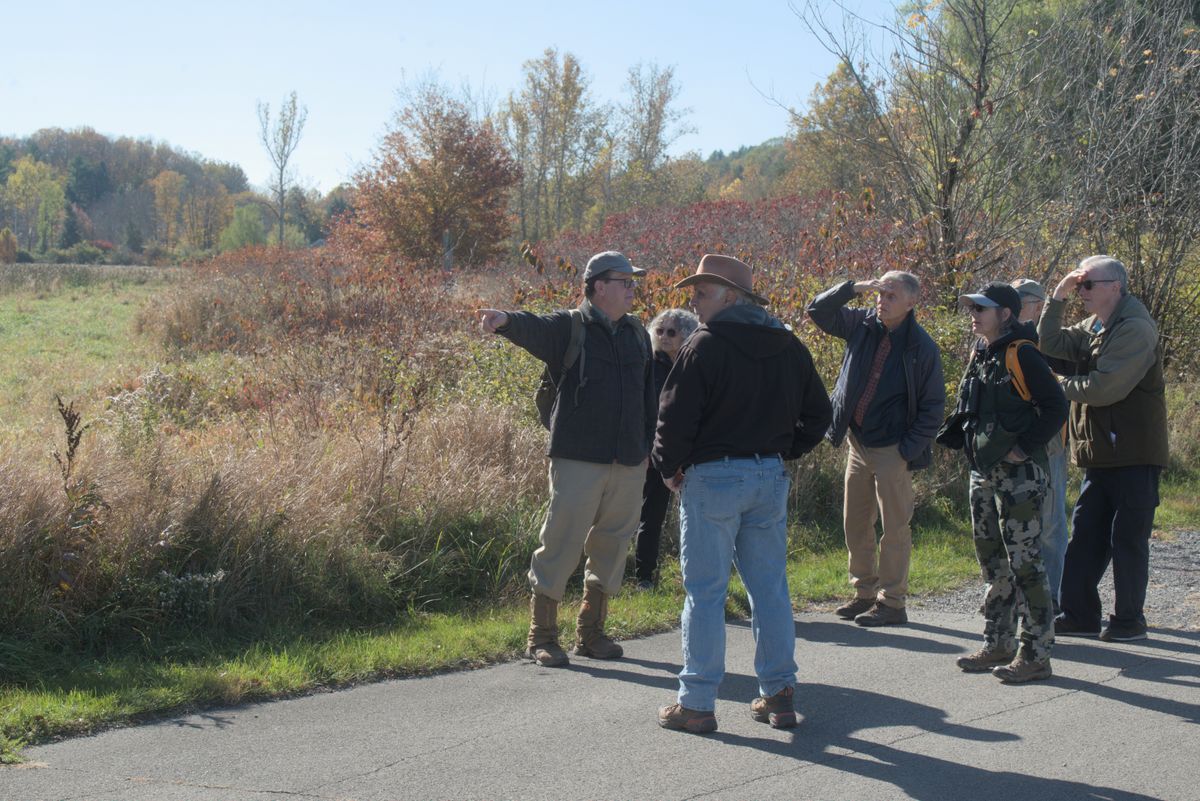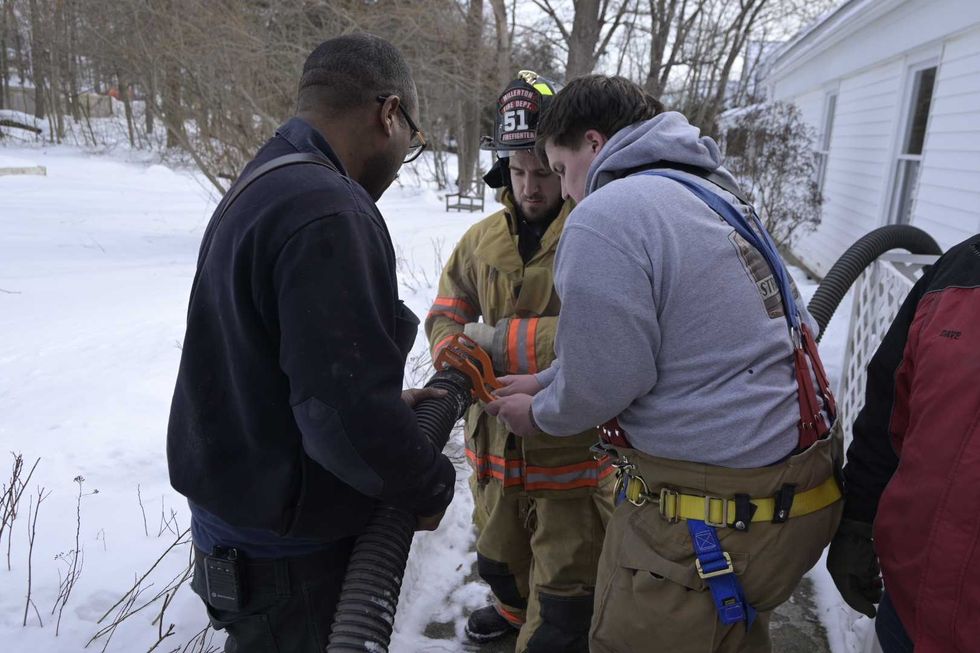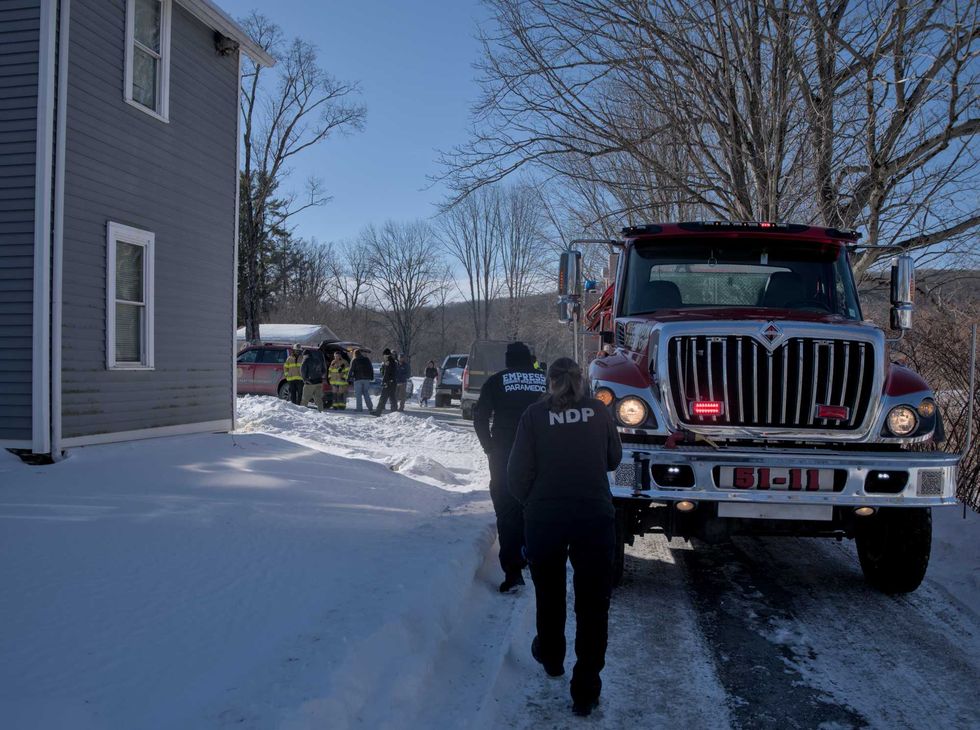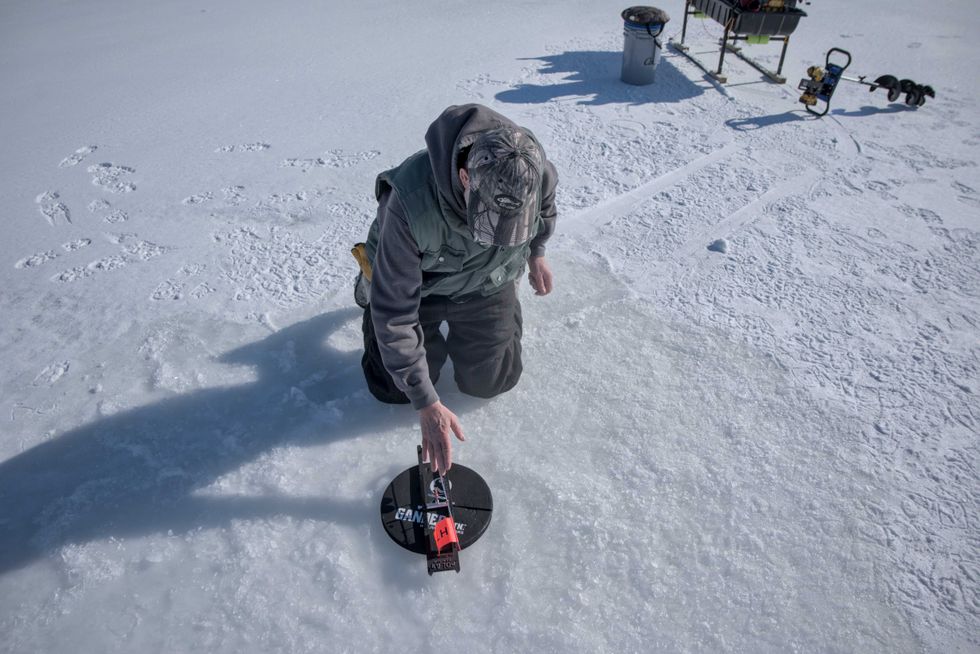Nature’s engineers: How beavers alter ecology

Wildlife biologist Mike Fargione led a group hike across Cary’s campus, pointing out beaver dams and lodges along the way.
Photo By Nathan Miller

Wildlife biologist Mike Fargione led a group hike across Cary’s campus, pointing out beaver dams and lodges along the way.
AMENIA — Clear, sunny skies welcomed a group to the paved trails at the Cary Institute Saturday, Oct. 19, for an educational hike and lecture on beaver ecology led by wildlife biologist Mike Fargione.
The hike started at a small parking area on the north edge of the Cary campus, where Fargione presented a collection of beaver pelts to the group. He explained that beavers were almost totally eradicated from New England after fur traders hunted them to near-extinction in the 1600s. Until the 20th century, he said, beavers were absent from the New England landscape, a region that at one point hosted hundreds of millions of the semi-aquatic, dam-building rodents.
Now, as a result of careful mangement and reintroduction, Fargione said the beaver population has grown to about 2 million.
This brings challenges, but it also allows the landscape to return to the transitive nature it had prior to European settlement 400 years ago. Fargione said the modern, agricultural landscape that exists in Dutchess County is the result of human intervention and the removal of beavers. Before beavers were nearly eradicated, the rodents carefully redirected water, manipulating wetlands and low-lying forests and fields to create cyclical habitats. Human farmers responded by channelizing streams, drying swamps and driving out beavers to create more consistently dry farmlands.
Now, as beavers make their return, their incessant need to dam up streams and create beaver ponds is in direct conflict with human infrastructure.
Roads on Cary’s campus have started to show serious signs of damage from the beaver’s hydro-engineering. One path has been completely closed because erosion has created a sinkhole in the middle of the pavement. One group of beavers created a pond that was flooding the nearby New York State Police Troop K headquarters on Route 82. Fargione took the group by a low-lying brush pit to demonstrate the huge changes beavers can cause.
Before the beavers came in, the low-lying area was a dense forest full of alders, red maples and aspen trees, beavers’ preferred foods. Two streams came down the mountains from the south, feeding water into the low-lying area, and heavier-than-usual storms started to flood the patch. Noticing the new flooding and the tasty wood, beavers got to work damming up the edges of the patch, creating a 20 acre area of standing water five feet deep at its deepest point. In a matter of weeks the slightly-wet forest was transformed into a murky swamp, bringing different animals and vegetation. The day of the hike the pond was dry, but Fargione said the water didn’t just evaporate.
“A lot of that water goes back into the water table, recharging our aquifer,” Fargione said.
The habitats created by beavers are essential to local wildlife. “There’s lots of wildlife here just because beavers changed the ecology,” Fargione said.
Millerton firefighters manage outflow from a pump they used to remove about six inches of standing water from the basement of the NorthEast-Millerton Library on Tuesday, Feb. 10.
MILLERTON — The NorthEast-Millerton Library is closed Tuesday, Feb. 10, after a pipe burst and flooded the basement.
The library's Executive Director, Rhiannon Leo-Jameson, said she could hear the sound of running water when she arrived at the library Tuesday morning. She then found about six inches of water had accumulated in the basement.
The library will remain closed until water can be restored. Leo-Jameson said limited library services will return Wednesday, Feb. 11, in the book sale room in the library's annex building on Century Boulevard.

Leo-Jameson said readers can pick up requested books and make returns. Public computers may be available, if library staff can establish an internet connection.
Visitors will not be allowed to browse the library or enter the main building until water can be restored. It's unclear when that will be. Leo-Jameson said librarians can retrieve books from the library shelves if readers have a specific title in mind.
Leo-Jameson said nothing of value was damaged in the flooding. A crew from the Millerton Fire Department arrived on scene and shut off water to the building around 9:45 a.m.
Firefighters on scene said the leak sprung from a water pipe in the residential apartment located above the library. Leo-Jameson said the old pipes have been known to burst in the past due to poor insulation.
Millerton firefighters exit a rear door at 5873-5875 S. Elm St. in Millerton after responding to a carbon monoxide exposure call at 2 p.m. on Monday, Feb. 9. Millerton Fire Chief Keith Roger said a deep fryer running indoors and the propane furnace may have contributed to the high levels of carbon monoxide in the building.
MILLERTON — As many as six are displaced from their homes due to uncertainty over the safety of the furnace after fumes from a gas-fired deep fryer filled an apartment building on South Elm Street.
Millerton Fire Chief Keith Roger said residents of 5873-5875 S. Elm St. operated a fryer indoors with no ventilation, potentially causing much of the exposure, but the propane furnace may have also contributed. No damage to the building was reported, but three people were treated for carbon monoxide exposure at Sharon Hospital.
Roger said the investigation was turned over to the Village of Millerton building inspector, who deemed the duplex apartment building an unsafe structure until the furnace can be inspected and approved.

Crews from the Millerton Fire Department, Amenia Fire Department, Empress EMS and the New York State Police responded to the call. The building was evacuated and ventilation of the dangerous gas had started when Amenia fire crews arrived on the scene around 2:45 p.m.
Carbon monoxide concentration reached as high as 180 parts per million on the second floor of the building, Roger said. Carbon monoxide exposure starts to become dangerous between 35 and 100 ppm, with concentrations of 200 ppm causing nausea, headaches and dizziness.
Roger said two people had already been transported to Sharon Hospital when first responders arrived. Crews discovered a third person showing signs of exposure during evacuation. No other injuries were reported.
John Dennis, of Millerton, presents a bluegill he caught in Rudd Pond on Friday morning, Feb. 6. Dennis said he catches enough fish for a meal — usually about a dozen fish — before packing up and shuffling off the ice.
MILLERTON — Rudd Pond is open for ice fishing as of Thursday, Feb. 5.
Taconic State Park rangers announced the ice was safe for fishing in a Facebook post Thursday morning. Ice on the pond must average at least 6 inches thick across the entire surface before it is opened to recreation, according to park staff.
On Friday, Feb. 6, Brian Booth of Millbrook and John Dennis of Millerton were out on the ice catching crappie and bluegill at 10 a.m.
"I've been fishing here since I was a kid," Dennis said. He was jigging, which is a fishing technique where a baited hook is dropped through a hole in the ice and "jigged" to simulate natural movement.
Booth was fishing through a combination of jigging and devices called "flip-ups," which have a line connected to a spring-loaded flag that flips up when a fish grabs the hook.

Temperatures are predicted to stay well below freezing for the next week. An extreme cold weather warning was in effect for the region all weekend and stretched into Monday morning on Feb. 9.
Forecasts predict heavy winds and blustery conditions to continue this week, with a chance for temperatures to increase leading into this weekend. Booth and Dennis each said that wind is a major contributor to uncomfortable conditions on the ice, where natural wind breaks are nonexistent.
Dennis uses a sled with a collapsible shelter to haul his ice fishing equipment onto the pond. He said that the tent can be a great boon, especially when combined with a small space heater.
"I could fish in my t-shirt," Dennis said.
But wind has caused problems when Dennis’s sled wasn’t anchored properly. He said he was dragged across the ice by strong gusts during a recent trip to a frozen lake in Connecticut.
Rudd Pond is open from sunrise to sunset year-round. Taconic State Park employees said they will continue to monitor the ice and provide updates on its status.
Drivers should expect more police on the roads this weekend as law enforcement warns of ramped-up DWI check-points over Super Bowl weekend.
Law enforcement is expected to ramp up DWI check-points across the region this weekend.
Across Dutchess County, local law enforcement agencies will take part in a “high-visibility enforcement effort” during Super Bowl weekend aimed at preventing drivers from operating vehicles under the influence of drugs and alcohol. Increased patrols and sobriety checkpoints are planned throughout the county from Sunday, Feb. 8, through Monday, Feb. 9.
In a statement, Dutchess County Executive Sue Serino emphasized the need for safe roads and thanked law enforcement who “work year-round to keep our neighborhoods safe.” She added, “Make the winning play during Super Bowl weekend and plan for a safe ride home.”
Nationwide, traffic fatality data indicates Super Bowl Sunday is one of the deadliest days of the year for impaired driving, with a significantly higher number of alcohol-related deaths than on typical Sundays.
During the Jan. 29 Village Board meeting, trustees voted to sign the annual STOP-DWI agreement with Dutchess County, part of a statewide effort to keep dangerous drivers off the roads. Similar efforts also take place around Memorial Day, Independence Day, Labor Day, Halloween, Thanksgiving and during the December holiday season.
Millerton Police Chief Joseph Olenik said his department typically participates in all DWI check-points, but will not this weekend because of staffing issues. He said that does not mean county and state police will not be active in the Millerton area.